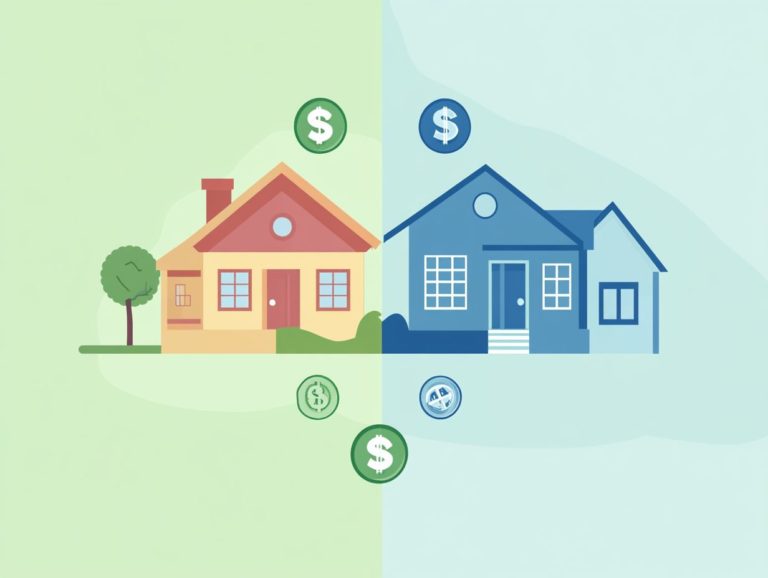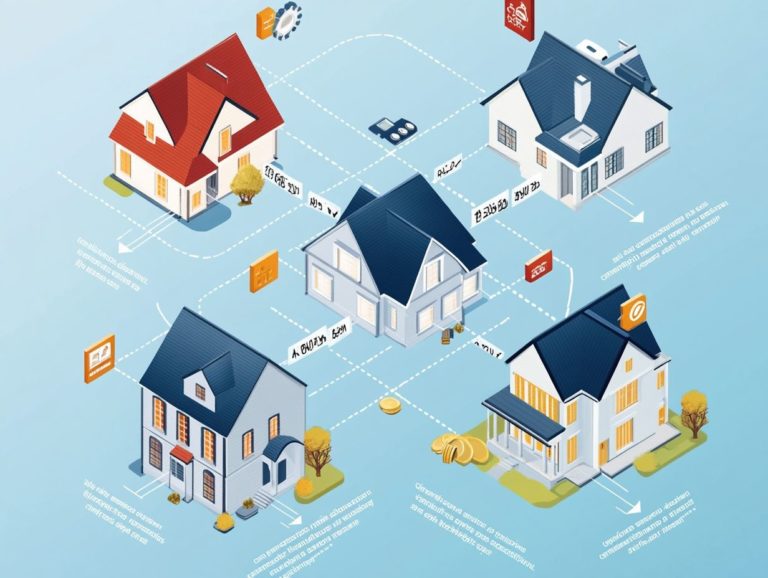What Is a Reverse Mortgage?
Reverse mortgages can serve as a valuable financial tool for you, especially if you’re a senior aiming to access your home equity without the weight of monthly mortgage payments.
This article will dissect the essentials of reverse mortgages, providing you with a clear definition, an overview of how they operate, and the eligibility requirements you need to consider.
You’ll discover the benefits they offer, including financial flexibility, alongside a candid discussion of potential risks and drawbacks. We will also examine alternative options for accessing your home equity, empowering you to make a well-informed decision about your financial future.
Contents
Key Takeaways:
Reverse mortgages let you tap into your home equity without selling or making monthly payments. To qualify, you must be at least 62 years old and own your primary residence. Key benefits include financial stability and flexibility for retirees, but be sure to carefully consider potential drawbacks and alternative options.
Understanding Reverse Mortgages
Understanding reverse mortgages is crucial if you re 62 or older and want to secure your financial future in retirement.
A reverse mortgage enables you to transform a portion of your home equity into cash. This provides you the flexibility to cover various expenses like property taxes, homeowner insurance, or even necessary home repairs.
This financial solution is primarily designed for your primary residence and comes with distinctive features, including a guarantee that you won t owe more than your home s value when it comes time to repay the loan.
What is a Reverse Mortgage?
A reverse mortgage is a financial product crafted specifically for homeowners aged 62 and older, enabling you to convert a portion of your home equity into cash without the weight of monthly mortgage payments.
This innovative loan type not only provides you with immediate access to funds ideal for healthcare expenses, home renovations, or simply enhancing your retirement income but also allows you to retain ownership of your home as long as you adhere to the loan terms.
To qualify, you’ll need to meet certain eligibility criteria, including having sufficient equity in your home, residing in it as your primary dwelling, and demonstrating the ability to manage property taxes and insurance.
The amount you can access typically hinges on factors such as your home s appraised value, your age, and current interest rates. This makes it essential for you to thoroughly understand the financial implications and long-term commitments involved before moving forward.
How Reverse Mortgages Work
The mechanics of reverse mortgages center on transforming your home equity into accessible funds. This enables you to continue living in your primary residence without the burden of monthly mortgage payments.
These loans are designed to allow lenders to provide you with cash based on your home s current value, while the loan balance gradually increases over time due to accumulating interest and fees.
Eligibility and Loan Structure
Eligibility for a reverse mortgage usually requires that you are at least 62 years old, own your primary residence outright, and possess sufficient home equity to qualify for the loan.
Lenders will often examine your financial stability to ensure you can cover ongoing expenses such as property taxes, homeowners insurance, and maintenance costs.
A reverse mortgage essentially converts your home equity into accessible cash, offering you flexible disbursement options like lump sums, monthly payments, or a line of credit.
As you tap into your equity, it s essential to recognize that this financing method will influence home ownership over time. The mortgage amount plus interest needs to be repaid upon your departure or sale of the property, highlighting the critical importance of home equity in this financial landscape.
Benefits of Reverse Mortgages
Reverse mortgages provide you with substantial benefits that can significantly enhance your financial stability and flexibility as an aging homeowner seeking to tap into your home equity.
By converting that equity into liquid cash, you gain the ability to alleviate financial stress, cover living expenses, and fund essential services all without the weight of monthly mortgage payments.
This option enables you to sustain your quality of life while enjoying access to your equity, making it especially advantageous during retirement.
Ready to explore your options? Talk to a financial advisor today!
Financial Stability and Flexibility
Reverse mortgages offer financial stability and flexibility during retirement.
They let you access your home equity, providing extra income with no monthly repayments. This strategy helps cover unexpected costs and enjoy a comfortable lifestyle in your golden years.
By using your home as a cash source, you can stay in your house while reducing financial stress. This approach allows for better future planning with increased confidence.
Possible Downsides of Reverse Mortgages
While reverse mortgages present valuable opportunities, consider the downsides and risks involved.
One concern is diminishing equity, which can threaten long-term financial security, especially during market downturns or unexpected expenses.
Stay alert to potential scams, particularly those aimed at veterans. Always research other financial options before deciding.
Considerations and Risks
It’s vital to understand the risks and downsides of reverse mortgages and their financial effects on your estate.
These products can reduce your home’s value over time, putting your financial legacy at risk. Your heirs might inherit a property with significant debt, limiting their options.
Be cautious of scams targeting vulnerable individuals, which can lead to further financial losses. Research thoroughly and consult financial advisors to protect your assets and your family s well-being.
Alternatives to Reverse Mortgages
When looking for alternatives, many financial products can help you access home equity while maintaining control over your finances.
Options include local government loans, proprietary loans, and single-purpose loans. These can help you manage financial responsibilities without the complexities of reverse mortgages.
Evaluate these alternatives carefully, ideally with mortgage counselors, to find the best fit for your situation.
Other Options for Accessing Home Equity
As a homeowner, you have several options for accessing your home equity beyond reverse mortgages. Consider local government loans and proprietary loans tailored to your financial situation.
Also consider cash-out refinancing and home equity lines of credit (HELOCs). Each product offers unique benefits and drawbacks that can affect your decision.
Cash-out refinancing lets you use your equity while possibly lowering your mortgage interest rate. However, it often requires a strong credit profile.
HELOCs provide borrowing flexibility, but their variable interest rates can lead to higher payments over time. Be cautious when opting for this option!
Frequently Asked Questions
What Is a Reverse Mortgage?
A reverse mortgage is a loan for homeowners aged 62 or older that allows them to access their home equity. Instead of making monthly payments, the lender pays the borrower in a lump sum, monthly payments, or a line of credit.
How Does a Reverse Mortgage Work?
The borrower retains ownership of the home and must pay property taxes and homeowners insurance. The loan is due when the borrower moves out, sells the home, or passes away.
What Are the Benefits of a Reverse Mortgage?
A reverse mortgage can provide extra income for retirees. It allows them to stay in their homes while accessing equity they ve built up over the years.
What Are the Risks of a Reverse Mortgage?
One risk is that the borrower may outlive the loan, receiving more money than the home is worth. This could lead to owing more than the home’s value, so consider all terms and risks carefully!
Can Anyone Get a Reverse Mortgage?
No, not everyone qualifies. Borrowers must be at least 62, own their home outright or have significant equity, and live in the home as their primary residence. Mandatory counseling is also required to understand the terms and risks.
How Can the Money from a Reverse Mortgage Be Used?
Borrowers can use the money for various purposes, like paying off existing mortgages, home renovations, or daily expenses. However, it can’t be used to buy a new home, and borrowers must maintain the property and pay taxes and insurance while the loan is active.






